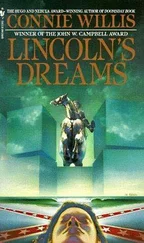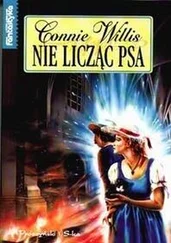“A fire?” Joanna said. Smoke and a fire. The death of a child by fire. She turned away from the windows and caught up to him. “Please tell me Maisie isn’t here.”
“Fire’s another death you don’t have to fear,” Mr. Briarley said. “Nasty, lingering death. Joan of Arc, Archbishop Cranmer, Little Miss—Ah, here we are,” he said, and stopped in front of a dark wooden door.
“No lying in state anywhere… a simple service… no speaking… the body not embalmed…”
—Part of FDR’s instructions for his funeral, which were not found until afterward and which had been completely disregarded
Joanna’s funeral wasn’t till Tuesday. Vielle came up to tell him. “The sister doesn’t trust any of the local ministers to conduct the service. She insists on bringing in her own hellfire-and-damnation specialist from Wisconsin.”
“Tuesday,” Richard said. It seemed an eon away.
“At ten.” She gave him the address of the funeral home. “I just wanted to let you know. I’ve got to get back down to the ER,” but she didn’t leave.
She lingered by the door, cradling her bandaged hand and looking unhappy, and then said, “What Joanna said—it might not have meant anything. People say all kinds of crazy things. I remember one old man who kept muttering, ‘The cashews are loose.’ And sometimes you think they’re trying to tell you one thing, and they’re actually trying to say something else. I had an ischemia patient one time who said, ‘Water,’ over and over, but when we’d try to give her a drink of water, she’d push it away. She was actually saying, ‘Walter.’ ”
“And—what?” Richard asked bitterly. “Joanna was really saying ‘Suez’? Or ‘soy sauce’? You and I both know what she was trying to say. She was calling for help. She was trying to tell me she was on the Titanic.”
He unplugged the EKG monitor. “That was what she’d come running down to the ER to tell me,” he said, winding up the cord, “in such a hurry she ran straight into a knife. That it wasn’t a hallucination. That it was really the Titanic.”
“But how could it be? Near-death experiences are a phenomenon of the dying brain.”
“I don’t know,” he said, and sat down and put his head in his hands. “I don’t know.”
Vielle went away, but late that afternoon, or maybe the next day, she came again. “I talked to Patty Messner,” she said. “She ran into Joanna just as she came through the door of the ER, and she asked if Dr. Jamison was there. She said, ‘I have to find Dr. Wright. Do you know where he is?’ ”
He must still have been harboring some hope that something, someone else had brought Joanna to the ER, because as she spoke, it was like hearing Tish telling him Joanna was dead all over again. He wondered numbly why Vielle had come up all this way to tell him that.
“Patty said Joanna was in a hurry, that she was out of breath. I think you’re wrong,” Vielle said. “About what she was coming to tell you.”
She paused, waiting for him to ask why, and then, when he didn’t, went on. “When I got shot, I didn’t tell Joanna because I knew what she’d say. She was always telling me I should transfer out of the ER, that I was going to get hurt. The last thing I wanted was for her to find out.” She looked expectantly at him.
“And Joanna knew I’d accuse her of turning into a nutcase if she told me it was the Titanic, is that the point you’re trying to make?” Richard asked.
“The point I’m trying to make is, I avoided Joanna for days so she wouldn’t see my bandage,” Vielle said. “The last thing Joanna would have done if it was really the Titanic was to have gone looking for you all over the hospital. Don’t you see?” she said earnestly. “What she’d found out must have been something good, something she thought you’d be happy about.”
It was a nice try. It even made sense, up to a point. “She was in such a hurry she almost ran me over,” Mr. Wojakowski had said. And maybe she had been coming to tell him “something good,” something one of her NDEers had told her, but whatever it was, it had been overwhelmed by the reality of what was happening to her, the panic and terror of being trapped on board. “SOS,” she had called, and there was no mistaking what that meant, in spite of Vielle’s well-meaning rationalizations. It meant, “I am on the Titanic. We are going down.”
“I think you should try to find out what it was, the thing she was coming to tell you,” Vielle said and went away, this time for good.
But any number of other people came, bearing books and advice. Mrs. Dirksen from Personnel, proffering a copy of Seven Mourning Strategies. “It’s not healthy to sit here all by yourself. You need to get out and be with people, try not to think about it.”
And Ann Collins with Words of Comfort for Trying Times: “God never sends you more than you can bear.” And somebody from Personnel Relations with a flyer for a Coping with Post-Trauma Stress Workshop the hospital had scheduled for Wednesday.
And a fragile-looking young woman with short blond hair. Her frailness, her youth were somehow the last straw, and when she stammered, “I’m… I was a friend of Joanna Lander’s. My name’s Kit Gardiner, and I came—”
He cut in angrily. “—to tell me it isn’t my fault, there was nothing I could do? Or at least it was quick and she didn’t suffer? Or how about God tempers the wind to the shorn lamb? Or maybe all of the above?”
“No,” she said. “I came to bring you this book. It—”
“Oh, of course, a book,” he said viciously. “The answer to everything. What’s this one? Five Easy Steps to Forgetting?”
He didn’t know what he’d expected. That she would look hurt and surprised, tears welling up in her eyes, that she would slam the book down and tell him to go to hell?
She did neither. She looked quietly at him, no trace of tears in her eyes, and then, in a conversational tone, said, “I slapped my aunt Martha. When my fiancé died. She told me God needed him in heaven, and I hauled off and slapped her, a sixty-year-old woman. They said I was half out of my mind with grief, that I didn’t know what I was doing, but it wasn’t true. People say unbelievable things to you. They deserve slapping.”
He stared at her in relief. “They—”
“—tell you you’ll get over it,” Kit said. “I know. And that it’s unhealthy to be so upset. And that you shouldn’t blame yourself, it wasn’t your fault—”
“—there was nothing anybody could have done,” he said. “But that’s a lie. If I’d gotten there earlier, if I’d had my pager on—” He stopped, suddenly afraid she’d say, “You couldn’t have known,” but she didn’t.
She said, “They all told me it wasn’t my fault. Except Uncle Pat.” She stopped, looking down at the book she held, and then went on, “It’s a terrible thing to be told it isn’t your fault when you know it is. Look,” she said, and started for the door. “I’ll come some other time. You’ve got enough to deal with right now.”
“No, wait,” he said. “I’m sorry I was so rude. It’s just that—”
“I know. My mother says it’s because they don’t know what to say, that they’re just trying to comfort you, but Uncle Pat says… said that’s no excuse for them telling you stupid things like you’ll get over it.” She looked up at him. “You don’t, you know. Ever. They tell you you’ll feel better, too. That isn’t true either.”
Her words should have been depressing, but oddly, they were comforting. “ ‘You think things can’t get any worse,’ ” he said, quoting Vielle, “ ‘and then they do.’ ”
Читать дальше












